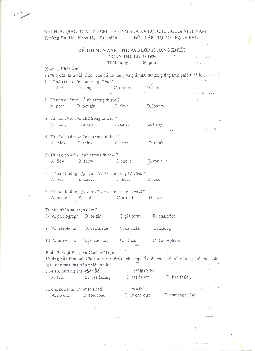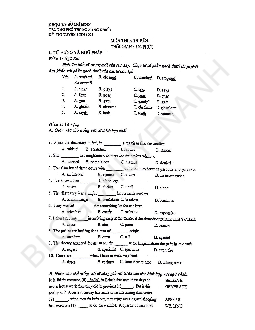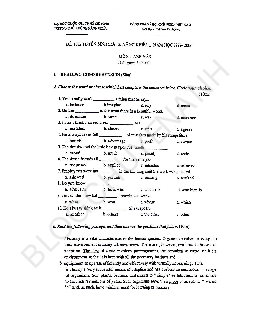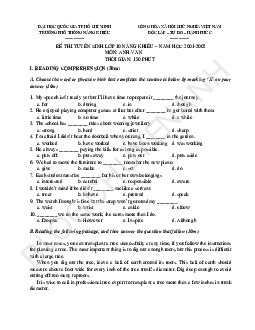





Preview text:
SỞ TUYÊN QUANG
Choose the correct answer to each of the following questions from 01 to 30.
Question 1. I asked him how far ______ from his house to the cinema. A. it was B. was it C. is it D. it is ●
Cấu trúc câu tường thuật dạng câu hỏi : S + asked (O) + What/ When/ How/ Who… + S +V
Question 2. Vietnam has been a _______ supply of many agriculture products for the last decade. A. unbelievable B. episodic C. dependable D. devastated ●
Unbelievable /ʌnbɪˈliːvəbəl/(a): Khó tin, lạ lùng, làm kinh ngạc, không thể tin được ● Episodic /epəˈsɑːdɪk/
(a):(thuộc) đoạn, (thuộc) hồi; (thuộc) tình tiết (trong truyện) ●
Dependable /dɪˈpendəbəl/(a):
Có thể tin được, đáng tin cậy, có căn cứ ●
Devastated/ˈdevəsteɪtɪd/(v): Tàn phá, phá huỷ, phá phách
Question 3. Unless you give up smoking, you will _______ the risk of damaging your health. A. run B. make C. suffer D. bear ●
Run the risk of doing smt (idm): có nguy cơ làm gì xấu ●
Cấu trúc câu điều kiện loại 1: Unless + S + V (simple present), S + will/can/shall + V
Question 4. All the plants and flowers in the garden _______ by my dad every day. A. are watered B. watered C. were watering D. will water ●
Cấu trúc câu bị động: S + be( chia) + V3/ed + by 0 ( S:đối tượng bị tác động bởi hành động)
Question 5. - Trung: “Thanks a lot for giving me a lift." - Lan: “_______ “ A.
You're right Bạn nói đúng. .
B. Have a good day!Chúc một ngày tốt lành!
C. It's my pleasure. Đó là hân hạnh của tôi. D. I'm afraid not.Tôi e là không.
Question 6. The bank won't lend you the money without some _______ that you will pay it back. A. profit B. interest C. charge D. guarantee ●
Profit/prɑːfɪt/(n):lợi nhuận ●
interest /ˈɪntrɪst/(n):lãi suất ●
charge /tʃɑːrdʒ/(n):Tiền phải trả, giá tiền, tiền công, tiền thù lao ●
Guarantee/ɡerənˈtiː/(n):(pháp lý) sự bảo đảm, sự cam đoan; sự bảo lãnh, sự bảo hành
Question 7. I liked that laptop _______ I couldn't afford to buy it. A. because B. or C. but D. so ● Because: bởi vì ● Or : hoặc ● But : nhưng ● So: do đó
afford to do smt: đủ khả năng để làm gì
Question 8. Most parents want their children _______ independent life. A. to lead B. leading C. lead D. leads ●
Want sbd to do smt: muốn ai đó làm gì ●
Lead independent life /liːd ˌɪndɪˈpendənt laɪf/: Sống độc lập
Question 9. We gave each other one wrapped present _______ Christmas Day. A. on B. in C. of D. to ●
Giới từ “on” chỉ các khoảng thời gian cụ thể hơn “in”; như là các thứ trong tuần, ngày
tháng cụ thể và vào các ngày lễ cụ thể có chứa từ “day”
Question 10. The picture _______ I bought was painted by a famous artist. A. whom B. whose C. who D. which ●
Đại từ quan hệ “which” thay thế cho “the picture” ●
Artist /ˈɑːrt̬ɪst/(n): nghệ sĩ
Question 11. We find advertising on Facebook very _______. A. effectiveness B. effects C. effective D. effect ●
Effectiveness/ɪˈfek·tɪv·nəs/(n): hiệu quả ● Effect /əˈfekts / (v) ● effective /əˈfektɪv / (a)
Question 12. More and more people enjoy _______ Vietnamese films because they find them gripping. A. watch B. to watch C. watched D. watching ●
Ẹnjoy doing smt: hứng thú làm gì ●
Gripping /ˈɡrɪpɪŋ/(a): hấp dẫn, thú vị
Question 13. This newly open restaurant is _______ as the old one in the city center. A.
the most expensive B. as expensive C. expensive D. more expensive ●
Cấu trúc so sánh bằng với tính từ : A + be (chia theo chủ ngữ và thì; khẳng/phủ định) +
as + ADJ + as + B + (do/does/did/will/…).
Question 14. My son plays _______ piano in his music band. A. the B. ∅ C. a D. an ●
“the” đưngs trước tên của một loại nhạc cụ
Question 15. They have planted many trees in our town, _______? A. don't they B. have they C. do they D. haven't they ●
Cấu trúc câu hỏi đuôi: đông từ chính “ have planted” --> havent they?
Question 16. We are going to donate _______ money to the local charity organization. A. few B. many C. some D. any ●
Some+N đếm được số nhiều và danh từ không đếm được ( thường dùng trong câu khẳng định): nhiều ●
Any+N đếm được số nhiều và danh từ không đếm được( thường dùng trong câu phủ định và nghi vấn): bất kì ●
Many+N đếm được số nhiều: nhiều ●
Few+ N đếm được: “rất ít”, không nhiều, “chỉ một vài”
Question 17. Some people say that Spanish is _______ to learn than English is. A. as difficult B. most difficult C. difficult D. more difficult Công thức so sánh hơn:
● Nếu từ chỉ có 1 âm tiết: ADJ/ADV + đuôi -er + than
● Nếu từ có 2 âm tiết trở lên: more + ADJ/ADV + than
Question 18. Kathy is fond _______ reading comic books in her free time. A. in B. of C. to D. on ●
Fond of doing smt: thích làm gì ●
Comic/ˈkɑːmɪk/(a): Hài hước, khôi hài
Question 19. It is always _______ to have a picnic with my close friends. A. interested B. interesting C. interest D. interestingly ●
Interested in smt /ˈɪntrɪstɪd/(a) cảm thấy thích thú ●
Interesting (a): hấp dẫn, thú vị ●
Interest /ˈɪntrɪst/ (n): sự quan tâm, tiền lãi,... ● Interestingly (adv)
Question 20. The teacher _______ the whole trip for her class to Da Nang next week. A. organize B. organized C. will organize D. was organizing
Question 21. The students said that they ______ their best to do the test. A are trying B. would try C. try D. will try ●
Câu tường thuật: S + say(s) / said + (that) + S + V( lùi thì)
Question 22. In spite of the bad weather, we still made a ______ to go fishing. A. decide B. deciding C. decision D. decisive ●
Make a decision: đưa ra quyết định ● In spite of noun: mặc dù
Question 23. If the weather ______ good, we would have a party in the garden. A. will be B. were C. is D. has been ●
Câu điều kiện loại 2 được sử dụng để diễn tả những tình huống không có thật, không thể
xảy ra trong tương lai và giả định kết quả nếu nó có thể xảy ra. ● If + S + V-ed, S + would + V
Question 24. – The man: "Can you tell me the way to the supermarket?”
– The boy: “______”
A.Yes, I like everything.Vâng, tôi thích mọi thứ.
B. It opens at eight o’clock.Nó mở cửa lúc tám giờ đồng hồ
C.Have a good time!Chúc bạn có một khoảng thời gian vui vẻ!
D. Turn right then turn left.Rẽ phải rồi rẽ trái.
Question 25. I really admire people ______ can play at least one musical instrument A. who B. whose C. whom D. which ●
Đại từ quan hệ “who” tha thế cho “the people”
Question 26. ______ Jack had many financial difficulties, he still managed to finish his study at university. A. So B. But C. Although D. However ● Although + clause: mặc dù ● So: do đó ● But: nhưng ●
However: tuy nhiên( đứng ở đầu câu khi nói về sự đối lập giữa hai ý tưởng. Trong một số
trường hợp, chúng vẫn có thể nằm ở giữa câu (trong một cặp dấu phẩy) hoặc cuối câu (sau dấu phẩy).)
Question 27. If everyone takes part in protecting the environment, our children ______ a better planet to live in. A. had B. have C. would have D. will have ●
Take part in ( phr verb): tham gia ●
Cấu trúc câu điều kiện loại 1: if + S + V (simple present), S + will/can/shall + V
Question 28. Thanks to pictures taken by satellites, deserts have not ______ a mystery in our time. A. hidden B. intended C. remained D. attained ●
Remain a mystery: vẫn là một bí ẩn ●
Satellite /ˈsæt̬əlaɪt/ (n): vệ tinh
Question 29. She ______ the group of people she was with to speak to us a few minutes ago. A. leaves B. left C. will leave D. is leaving
Question 30. We are ______ an experiment to test how the metal reacts with water. A. doing B. taking C. paying D. making ●
Do an experiment: làm thí nghiệm ●
Mental /ˈmentəl/(n): kim loại
Read the passage below carefully and choose the correct answer A, B, C or D to complete the questions from 31 to 35.
Botswana, officially the Republic of Botswana, is a country in southern Africa that shares
borders with South Africa, Namibia and Zimbabwe. The capital, Gaborone, (31) _______ on
the Notwane River in the South east of Botswana. The Kalahari Desert covers more than 70%
of Botswana. The Kalahari isn't a true desert because it rains more each year there than in
most (32) _______ deserts. Despite this, Botswana is a dry country. When it does rain, the
rain is often heavy and there are floods.
Botswana is a popular tourist destination, with people from all over the world coming to see
its amazing animals. During the seasonal floods, the land becomes a lush animal habitat. The
wide variety of wildlife (33) _______ elephants and lions. Many visit Chobe National Park to
see its 70,000 elephants, (34) _______ are the largest of all living elephants. The grassland
and river valleys are home (35) ______ giraffes, cheetahs, hyenas and wild dogs. The baobab
tree, an icon of the African savannah, plays an important role in Botswana culture and nearly
every part of it is useful. For example, it is used to make rope and people pick the leaves to make soup. Question 31. A. lies B. gets C. sets D. puts Question 32. A. another B. every C. any D. other
Question 33. A. consists B. contains C. involves D. includes Question 34. A. what B. who C. where D. which Question 35. A. at B. by C. to D. in 31. ●
lie + adv./prep. Lie on borders : nằm trên biên giới 32. ●
Any+N đếm được số nhiều và danh từ không đếm được( thường dùng trong câu phủ định và nghi vấn): bất kì ●
Every + N đếm được số ít: mỗi ●
Other + N đếm được số nhiều/ không đếm được : những cái khác ●
another+ N số ít: cái khác 33. ● consist of sbd/smt: gồm có ●
Contain smt/kənˈteɪn/ (v): chứa ●
Involve /ɪnˈvɒlv/(v): liên lụy, liên quan (if a situation, an event or an
activity involves something, that thing is an important or necessary part or result of it) ●
Include /ɪnˈkluːd/ (v): bao gồm, gồm có ( bao gồm những thứ là một phần của nó) ● 34. ●
Đại từ quan hệ “which” thay thế cho “the elephant”. ● 35. ●
Be home to smt: là nguồn cội/quê hương/nhà của gì đó
Read the following passage and choose the letter A, B, C or D to indicate the correct
answer to each of the questions from 36 to 40.
Most people would say they know what stress is, but for scientists who study stress, it has
been surprisingly hard to define. This is because there are so many ways of looking at stress.
Some researchers have studied how our bodies react to stress. You know how your heart
beats faster, you perspire more heavily, and your words do not come out right when you are
placed in a stressful situation. But knowing how we feel when experience stress does not
explain it; nor does it tell us what causes it.
Other scientists have looked at stressors: events or situations that produce stress. A deadline,
a poor test performance, or bothersome noises all may be thought of as stressors. Even
pleasant events can be stressors. Planning a party or starting a new job can be just as stressful
as being called to the principal’s office. Stress, then, can be caused by both negative and
positive events, or stressors. Of course, whether an event is thought of as positive or negative
is, in some ways, a matter of personal choice.
In sum, it is the way people interpret an event that makes it stressful or not stressful. This
process of interpretation is called appraisal. Depending on how people appraise, or judge,
circumstances, they may or may not consider them stressful.
Question 36. What is the passage mainly about? A. Stress and students
B. Definition of stress Định nhĩa cua căng thẳng C. Stress in family D. Advantages of stress ●
Key: Most people would say they know what stress is, but for scientists who study stress,
it has been surprisingly hard to define.
Question 37. The word “it” in paragraph 1 refers to ______. A. experience B. stress C. body D. situation
Question 38. Which of the following is NOT mentioned in paragraph 2 as stressors? A.
Faster running Chạy nhanh hơn
B. A poor test performanceHiệu suất kiểm tra kém
C. Annoying noisesTiếng ồn khó chịu D. A deadline thời hạn ●
Key: A deadline, a poor test performance, or bothersome noises all may be thought of as stressors.
Question 39. The word “pleasant” in paragraph 2 is closest in meaning to ______. A. modern B. boring C. enjoyable D. careful
Pleasant /ˈplezənt/= enjoyable/ɪnˈdʒɔɪəbəl / (a): vui vẻ, dễ chịu ●
Modern /modern/ (a): hiện đại ●
Boring /ˈbɔːrɪŋ /(a): tẻ nhạt ●
Careful/ˈkerfəl/(a): cẩn thận
Question 40. According to paragraph 3, which of the following can make an event stressful or not? A.
The bad results of performances.Kết quả tồi tệ của các buổi biểu diễn
B. The way people interpret it.Cách mọi người giải thích nó.
C. The place where it happens.Nơi mà nó xảy ra.
D. The attitudes of the others. Thái độ của những người khác. ●
Key: In sum, it is the way people interpret an event that makes it stressful or not stressful. --- THE END ---




